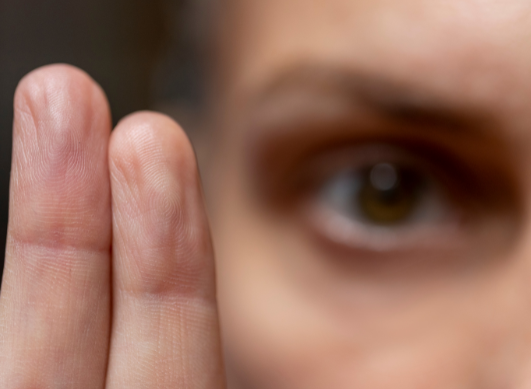EMDR Therapy: What Does It Treat?
Published 3 Jun 2024 • By Candice Salomé
EMDR therapy (Eye Movement Desensitization and Reprocessing) is a method primarily used to treat cases of post-traumatic stress disorder (PTSD), but it is also effective in managing other mental health conditions.
So, what exactly is EMDR? What conditions can it address? How does a session work, and who should you consult?
We'll tell you everything in our article!

What is EMDR?
EMDR, or Eye Movement Desensitization and Reprocessing, was first described in scientific publications by the American psychologist Francine Shapiro in 1987.
Initially tested on individuals suffering from previous mental trauma, such as Vietnam War veterans, EMDR targets individuals' traumatic memories. It aims to address the psychological, physical, or relational consequences related to a psychic trauma. The effectiveness of EMDR was validated in 2013 by the World Health Organization.
EMDR is practised alongside a psychologist or psychiatrist over several sessions. During these sessions, the practitioner moves their fingers in front of the patient's eyes for them to follow with their gaze. They may also use auditory and tactile stimuli, such as on the hands.
EMDR can be recommended following a traumatic shock. When the mind is overwhelmed and the brain is unable to process or digest certain information, it can remain stuck on this event without the patient even being aware. This can lead to conditions such as post-traumatic stress disorder (PTSD) or neurotic problems.
What conditions can EMDR therapy treat?
EMDR is effective in many cases. It allows numerous patients to heal from certain traumas, emotional shocks, or bereavements. This therapy also helps treat disorders and manifestations that may result from:
- Anxiety
- Irritability
- Night terrors
- Nightmares
- Tendency to isolate
- Certain eating disorders (ED)
- Somatization
- Depressive states
How does an EMDR therapy session take place?
EMDR follows an 8-phase treatment protocol:
Diagnosis and Planning
The first step is to ensure EMDR is suitable for the patient and their issues. This involves an evaluation to confirm the patient's capacity to face their traumatic memories, as they will be revived during therapy. The practitioner then prepares a treatment plan.
Preparation and Relaxation
The practitioner prepares the patient by explaining the session's process. They train the patient in relaxation techniques and ensure they can control the emotions that will follow the revival of traumatic memories.
Assessment
During this phase, the practitioner and patient identify the memories to be treated. For each anxiety-inducing event or situation in the present, linked to a traumatic past event, the patient must choose an image representing the event or situation, a negative idea associated with the event ("negative cognition"), and a positive idea to boost self-esteem ("positive cognition").
Desensitization
Here, the patient focuses on the traumatic image, the negative idea, and the bodily sensations. The practitioner moves their fingers or a light source in front of the patient's eyes, alternately from side to side. Other stimuli, such as sounds or tactile stimulations, can also be used in this phase.
The patient follows the natural mental associations that occur during this exercise. The series of stimulations continue until the memory is no longer a source of disturbance and is associated with calm feelings and positive, constructive thoughts.
Installation
This phase aims to verify the accuracy of the positive belief and strengthen its link with the targeted memory.
Body Scan
The goal here is to connect the positive belief established during the installation phase with the physical sensations felt by the patient.
Closure
At the end of an EMDR session, the practitioner ensures the patient is in a stable emotional state. They also prepare the patient to react appropriately (through relaxation exercises) if the memory of the traumatic experience resurfaces between sessions.
Reevaluation
At the beginning of the next session, the practitioner evaluates the effects of the previous session and decides whether to continue treating the same memory or move on to another targeted memory.
Each session lasts between 60 and 90 minutes. It is possible to have up to 3 sessions for an isolated trauma, or up to 20 for a more significant case.
Who should you consult for EMDR therapy?
To practice EMDR in the UK, therapists must become members of EMDR UK or EMDR Europe, have regular supervision with an EMDR Europe-accredited consultant and demonstrate continued professional development in EMDR. EMDR can be practised by a registered psychotherapist, psychologist, or psychiatrist, in an office, hospital, or even online.
Caution: when the traumatic event has caused deep disturbances, EMDR is not without risk, and it is better to avoid it. Sessions can indeed trigger severe dissociative episodes, which are then difficult to treat.
Was this article helpful to you?
Give it a "Like" and share your thoughts and questions with the community in the comments below!
Take care!
Sources :
L’EMDR pour traiter le stress post-traumatique, vraiment ?, Inserm
Thérapie EMDR : comment peut-elle vous venir en aide ?, Qare
OSTERMANN Gérard, « L’EMDR », Hegel, 2019/1 (N° 1), p. 15-18. DOI : 10.3917/heg.091.0015.
La thérapie EMDR : comment et pourquoi ?, Novoo Moi
Intégration neuro-émotionnelle par les mouvements oculaires, Wikipédia

 Facebook
Facebook Twitter
Twitter


